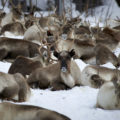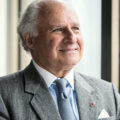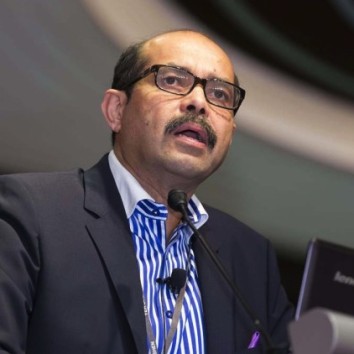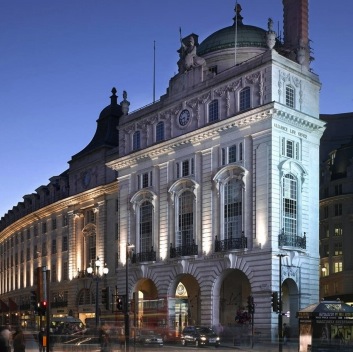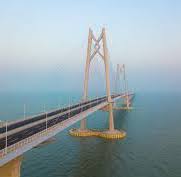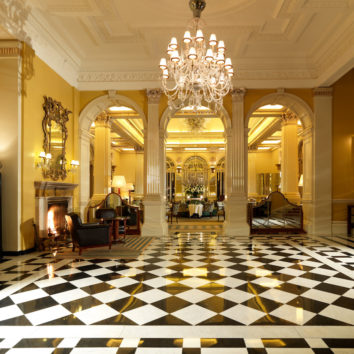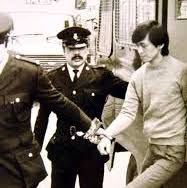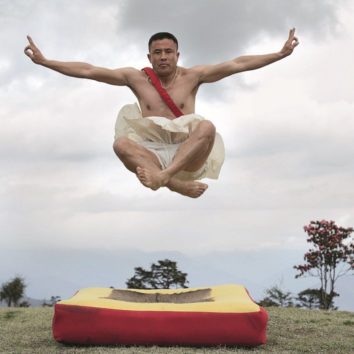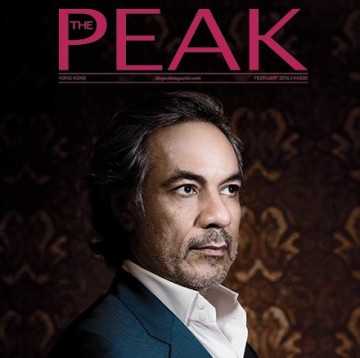
Leader of the pack
— February 1, 2016Tasked with building upon one of Hong Kong’s greatest success stories, Aron Harilela shares his vision for growing his father’s legacy, the family hotel business and why he thinks Hong Kong will continue to be a global economic hub
![]()
Harilela is wearing all black, the top few buttons of his shirt undone, and his almost shoulder-length hair flicked out of his face. As you might expect of someone who went to boarding school in the UK aged 13, his manners and accent are very British.
He orders coffee with the politeness of a proper Brit − “May I have, please and thank you”. But we aren’t in a café, we are in the sitting room of the Harilela mansion in Kowloon Tong. Or more accurately, one of the sitting rooms. The ground floor of the sprawling mansion, which is designed for entertaining, has several lounges and dining rooms.
Family is a very big deal to the Harilelas and this is underlined by the fact that almost 100 of them live together in a massive compound made up of two adjoining mansions. Sixty family members live in the main house and an internal passageway connects it to the neighbouring mansion, where another 35 live. The décor is Indian with rich colours, plenty of gold and chandeliers. This is where Aron Harilela, the 46-year-old chairman and chief executive of Harilela Hotels, grew up.
“It was a fun childhood. You never got bored because there was always someone to play with – riding on bicycles or skateboards,” says Harilela. “And when my parents were abroad I could always go to my auntie or uncle to have lunch or dinner with them.” The whole family aims to eat together only on Sundays and special occasions. For everyday meals, a central kitchen prepares food and sends it up to the apartments by dumbwaiter. And there’s a central laundry that looks after everyone’s clothes.
The logistics of running the family household − more like a hotel than a regular home − meant Harilela adapted easily to life at boarding school. While his new school pals thought it odd to have their clothes tagged so they wouldn’t get lost in the communal laundry, Harilela was unfazed.
“My clothes had always been tagged. I was `H6′ because my father was Hari and I was the sixth child,” he says.
He was Hari Harilela’s only son. Harilela senior, who died in 2014 aged 92, is often hailed as one of Hong Kong’s great entrepreneurial success stories. Born in Hyderabad, Sindh, he moved to Canton − now Guangzhou − in 1922 with his mother and two brothers. From there, the family moved to Hong Kong, where they became successful in the tailoring business. Hari Harilela got a hunch that there was money to be made in the hotel business, but his brothers were wary.
“They didn’t want to get out of the tailoring business into the hotel business because they thought, ‘We are making 900 suits a day, we have 600 tailors working for us. Why would you want to get out of such a lucrative business?’” says his son.
But Hari Harilela took the plunge and, with shareholders, bought land in Tsim Sha Tsui to build a hotel. There was trouble ahead. Soon after the deal went through, the 1967 riots shook Hong Kong. Many of the shareholders became jittery and wanted out.
Hari Harilela approached Hong Kong and Shanghai Bank banker Michael Sandberg and asked to borrow HK$5 million. Sandberg asked for Harilela’s house as collateral, but that wasn’t up for negotiation.
“My dad said, ‘I will not give my house to anyone’. So Sandberg said, ‘Give me your word’. So Dad gave him his word. Then he bought the other shareholders out,” says Harilela.
But that wasn’t the end of his troubles. In 1971, as construction workers were excavating the three- floor basement by hand, the worst typhoon in Hong Kong history lashed the city. Typhoon Rose sank ships, sparked fires and left hundreds homeless. It also flooded the site of the proposed hotel.
“My whole extended family were saying to my dad, ‘What are you doing?’ But he said, ‘I’m going to keep doing it’,” says Harilela.
The Holiday Inn Golden Mile opened on Nathan Road in 1975, long before the district was popular with tourists and locals. On the day of the opening, Hari Harilela’s mother passed away. He stayed home to mourn and sent his son to do the honours. It was an early start in the hotel business.
“I was four years old. I remember cutting the ribbon, but I’m not sure I comprehended exactly what was going on; I’d probably seen my dad do it before,” says Harilela.
GROOMED TO SUCCEED
There was never any doubt that he would work in the hotel business. Knowing he was destined to join the family firm, Harilela felt prompted to choose academic subjects that had little to do with business. At the University of Hull, he earned a BA in law and politics and then stayed on to complete a doctorate in political philosophy. Presumably to keep his son on track, the elder Harilela sent him occasional batches of company documents throughout his schooling and university years.
“I’d get a bunch of papers once in a while and read them, probably without a huge amount of comprehension in those days,” says Harilela. “Besides the physical distance of being at school or university, you are not intimately, emotionally connected [to do the business].”
After completing his PhD, the 25-year-old returned to Hong Kong in January 1996. In hindsight, he wishes he’d taken a few months off to travel, but instead it was straight to work. He worked with his father for 19 years before his death two years ago. Fortunately, his father saw him married before he passed away.
Harilela is a good storyteller. He has plenty of charm, looks you in the eye when he speaks and isn’t afraid to send himself up a little. After describing his first date with his future wife, it seems remarkable they ever got as far as saying “I do”. He first met Laura Sellati at the Kee Club through a friend. They’d chatted a couple of times before he suggested a date, one he refers to as “the worst date of my life”. Sellati was based in New York and working as the director of international marketing for MAC cosmetics, a role that took her to Hong Kong on business.
Harilela was playing tennis at the Hong Kong Country Club and suggested she join him there after the match for dinner. He arranged for his father’s chauffeur to drive her to the club. The driver would collect her after dropping Harilela senior off at a dinner. Harilela played his match, had a quick shower and met Sellati for dinner, but she wasn’t in an affable mood.
“It was a terrible date. She refused to talk to me, saying nothing except `Yes’ or `No’. I dropped her back home and then called a friend, saying, ‘I’ll never call her again’,” he recalls.
Except that he did − “Maybe I was intrigued as to why it went so badly.” Things were better this time, and after they’d been dating a few months, he found out why that first date had been such a disaster. Unbeknown to Harilela, his father’s usual car was in the garage for repairs, so the driver collected Sellati in a white Rolls-Royce. Laura didn’t like the flashy move, telling him later: “I thought you were the biggest playboy ever.”
But by then they were able to laugh about it. A year later, he proposed and the following year, in December 2011, they married.
Recent years have been relatively uneventful for Harilela. On the personal front, his first child, Uma Rose, was born in May last year, the latest addition to the Harilela clan. She is a happy, smiley baby and although he mentions that she “doesn’t particularly sleep much,” he’s clearly besotted. (It is Uma’s sweet face on his iPhone screensaver).
A NEW BUSINESS VISION
On the work front, a project launched a couple of years ago − “to find the next Golden Mile” − is keeping him busy.
There was never any doubt that this new project would be in Hong Kong. After years of developing hotels overseas − Bangkok, Singapore, Penang, the UK − he believes it’s time to re-invest in Hong Kong. A site on Lockhart Road, a 10-minute walk from the Hong Kong Convention and Exhibition Centre, has been bought and construction is underway with an expected launch date in 2019. But this will be unlike any other property in the Harilela Group.
“Previously the business strategy was we build or buy hotels and give them to someone else to run, whether its Holiday Inn, Sheraton, Westin or InterContinental,” says Harilela. “This is the first ever hotel we are going to run. It’s an exciting development, a big change.”
He has a clear idea about the décor, which will be similar to the group’s Belgrave Hotel in London, with warm colours and a clubby feel. “When my mother walks into Belgrave, she says, ‘What happened to the chandeliers in here? Where’s the crystal? Where’s the Shiva statue?’ What I’d like is to bring it down a notch. It will be four-star certainly and designer led,” he says.
Harilela learned a lot working with his father, he says, chiefly not to kick yourself for every little mistake and to always look to the future. He might also do well to take a leaf from his father’s book and be prepared to stand strong in the face of economic uncertainty. Harilela says he had been worried about possible political unrest for several years before Occupy Central and the recent incident of the missing booksellers is unsettling.
“I think it is shaky times in Hong Kong. The mainstream Hongkongers who are not anti- Beijing but just want to get on with their lives, feed their families and have their businesses are seeing this drop in retail and are going to get angry at some point,” says Harilela.
He fears this sentiment may erupt into violence. He understands the complaint of many Hong Kong people that they feel like second-class citizens in their own city and he recognises their grievances over inflated property prices, competition for hospital beds and the powdered milk fiasco. The solution, he says, is to have a channel for those voices to be aired.
“We don’t have party politics and without party politics, the chief executive will never have a mandate. Without party politics, Hong Kong will suffer greatly,” he says. No doubt he has thought deeply about these issues and he’s well aware that his academic background − he does have a PhD in political philosophy after all − makes him “a little more left- wing” than most local business people, but he doesn’t doubt the future of the city.
“I think we all have to weather some storms in our economic life. But we believe in Hong Kong; it’s still going to be the centre of renminbi trading, you’re still going to have the financial centre, the Hong Kong Stock Market is one of the biggest in the world,” says Harilela.
It’s impossible to write about Harilela without mentioning polo, one of his great passions.
It was at university that he indulged an early love of horse riding, riding with friends on the Yorkshire Dales. A few years after he returned to Hong Kong, he began riding and then jumping at Beas River in the New Territories. When he discovered polo in Singapore, he wasted no time taking an intensive course in Jaipur over a holiday and then began to play competitively.
He aims to play two weekends a month during the five-month season in Thailand and couple of times a year in England. It is a potentially dangerous sport. He broke his collarbone six years ago when his horse took a tumble, but that didn’t put him off and now his personal challenge is to improve his handicap.
“If you’re a non-professional player, usually your handicap is 0. Mine is 1 and I think I can get to 2. You can start being a professional at 2. If I can get to 2 in my life, I’ll be happy,” he says.
[PDF url=https://www.hongkongkate.com/wp-content/uploads/2016/02/P32-39_coverstory_Harilela_OP.pdf]
